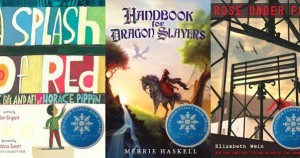
Defined By Others
When privileged outsiders define us, they often do so out of ignorance, self-interest, or malice, and their versions of ourselves, rather than our own realities, become the norm.

When privileged outsiders define us, they often do so out of ignorance, self-interest, or malice, and their versions of ourselves, rather than our own realities, become the norm.

A princess with a clubfoot. Who can resist? We can’t, and apparently the Schneider Family Book Award jury couldn’t, either. Merrie Haskell’s 2014 win of the award was just one of the reasons we wanted to discuss her MG fantasy novel Handbook for Dragon Slayers with her.

Don’t Touch is an insightful look into the life of a girl with OCD, and we were delighted to interview author Rachel M. Wilson about this wonderful debut.
Diversity in children’s literature is often represented as an either/or, without intersectionality; characters can either be autistic or gay, for example, or a wheelchair user or Black, but rarely both. Why is that?

Julian Birch has a “withered” leg from a childhood bout of polio, and Mitchell’s depiction of him is one of the most believable, relatable portrayals of disability I’ve come across.

You Look Different in Real Life is a contemporary YA novel in which the broken friendship between the protagonist and her autistic best friend plays a central role–a thoughtfully handled plot thread that we were eager to talk to author Jennifer Castle about.
Clichés, ableist language … what kinds of words, phrases, or situations used in book or character descriptions send up warning flags for our contributors?

April Henry’s main character in Girl, Stolen is a well-researched, well-written example of blindness, and we were thrilled to discuss the book with her.

s.e. smith’s rave review of Wild Awake was one of the very first posts on this blog. We invited s.e. and author Hilary T. Smith to discuss books, mental illness, and everything in between.

We’ve been wanting to shake hands with the good folks of the Schneider Family Book Award–an ALA award which highlights depictions of disability in children’s literature–for a while, and July 2014 marked the perfect time: while we celebrated our first anniversary, the Schneider celebrated its tenth!